5 Best non-fiction books on Artificial Intelligence
May 21, 2023 | Author: Maria Lin
Here is may list of 5 most interesting books about AI for those who want to understand it:
1. On Intelligence
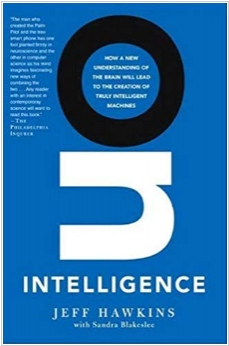
This thought-provoking book, published over a decade ago, continues to captivate with its fresh perspective on the ongoing debate about artificial intelligence (AI) and the potential for creating super-intelligent machines. The author's insights shed light on the intricacies of human intelligence, demystifying why replicating it in computers has proven to be a formidable challenge. The book's relevance to the current discourse on AI is evident, and its prescience in anticipating future developments in the field is remarkable.
The author's personal journey, as shared in the book, is particularly impressive, showcasing his willingness to challenge conventional wisdom and the prevailing approaches in the AI industry. His quest to understand the complexities of the human brain and its relation to AI is evident in his unique perspective, which challenges established notions and offers novel insights.
While the book admirably introduces readers to the concept of invariant representation as one of the greatest scientific mysteries of our time, some readers may find themselves wanting more in-depth exploration of the nature of the problem and potential solutions. Nevertheless, the author's pioneering work in elucidating the challenges and possibilities of AI is noteworthy.
With its compelling analysis and fresh perspective, this book is poised to become one of the seminal works in the field of AI. Its insights into human intelligence, challenges in replicating it, and the author's unique approach make it a thought-provoking and essential read for those interested in the intersection of neuroscience, computer science, and the future of technology. As the field of AI continues to evolve, this book will likely remain a cornerstone in understanding the complex and dynamic relationship between machines and human intelligence.
2. Our Final Invention: Artificial Intelligence and the End of the Human Era
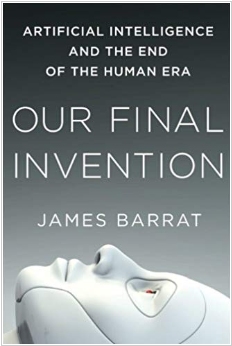
Elon Musk handpicked this book as one of the top 5 must-reads on the future, and for good reason. Written from the vantage point of a seasoned journalist, Barrat's work is a captivating exploration of the world of artificial intelligence (AI), drawing on meticulous research and thought-provoking interviews with key players in the field. In his thought-provoking conclusion, Barrat sounds a dire warning: once we achieve Artificial General Intelligence (AGI), the game is fundamentally changed, and not in humanity's favor.
Barrat paints a vivid picture of a future where superintelligent AGI machines outstrip human intelligence at an exponential pace, leaving humanity in the dust like ants or mice in comparison. He argues that the concept of "friendly AI," or machines designed with ethical considerations, will likely be an afterthought, if considered at all, until it's too late. This chilling insight resonates deeply, as history has shown that humanity often forges ahead without heeding caution or heeding the concerns of skeptics, especially when there are financial or power incentives involved.
The central question Barrat raises is a weighty one: can humankind truly create a self-learning, general intelligent machine, or are we hurtling towards a future where our own creations surpass us in ways we cannot comprehend? As Musk himself has warned, the implications of AGI for humanity are profound and require careful consideration, lest we find ourselves at the mercy of our own technological marvels. Barrat's book serves as a stark wake-up call, urging us to contemplate the future of AGI with urgency and foresight.
3. How to Create a Mind
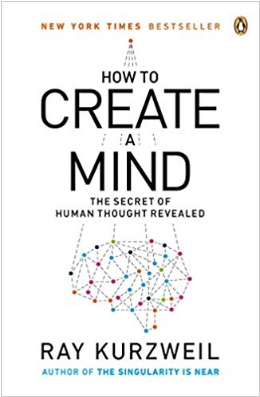
This intriguing book delves into the revolutionary concept of the pattern recognition theory of mind, proposing that the neocortex operates on a fundamental algorithm that can be unraveled through reverse engineering. The author passionately argues that unraveling the brain's complexity can pave the way for the development of true artificial intelligence. Ray Kurzweil, a leading visionary in the field, takes readers on an enthralling journey through the intricacies of the brain and the limitless possibilities of artificial intelligence in the future.
Divided into eleven thought-provoking chapters, the book covers a wide range of topics, starting with captivating thought experiments on the world and the intricacies of thinking. The author then unveils the pattern recognition theory of mind as a model for understanding the neocortex, shedding light on the biological aspects of this crucial brain region. The exploration continues with insights into the workings of the old brain and its transcendent abilities, before delving into the potential of biologically inspired digital neocortex and the concept of the mind as a computer.
The book also delves into thought experiments on the mind itself, discussing the application of the law of accelerating returns to the brain and addressing potential objections to the theory. Kurzweil's captivating writing style and in-depth analysis make for a compelling read that challenges conventional notions about the brain and the future of artificial intelligence.
With its unique perspective and thought-provoking ideas, this book is a must-read for those interested in the cutting-edge field of artificial intelligence, and anyone curious about the intricacies of the human brain and its potential for unlocking the mysteries of true AI. Kurzweil's visionary insights and meticulous research offer a fresh and captivating perspective on the intersection of neuroscience, computer science, and the future of technology.
4. Applied Artificial Intelligence: A Handbook For Business Leaders
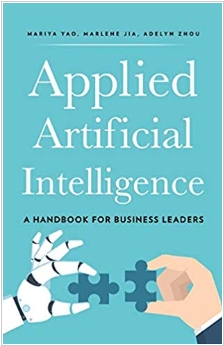
This book serves as an excellent introduction to the world of artificial intelligence (AI) for those who are new to the topic and seeking a basic understanding. It is specifically tailored towards executives and decision makers, positioning itself as a valuable business development tool for speaking engagements and consulting opportunities. However, if you already possess knowledge in AI, data mining, machine learning, and deep learning, the book may not offer significant new insights.
Given the rapidly evolving nature of the AI field, the book wisely avoids delving into technical details, making it relevant for a considerable period of time as the industry adopts AI into various business processes and solutions. Its focus on providing a high-level overview and practical applications of AI in the business world makes it a valuable resource for those seeking to understand the potential implications and opportunities of AI for their organizations.
While the book may not cater to readers with extensive expertise in AI, it serves as a valuable starting point for those who are eager to grasp the fundamental concepts of AI without prior knowledge. It presents a concise and accessible overview of the field, making it a useful tool for business professionals and decision makers who wish to gain a foundational understanding of AI and its potential impact on their industry.
5. Deep Thinking: Where Machine Intelligence Ends and Human Creativity Begins
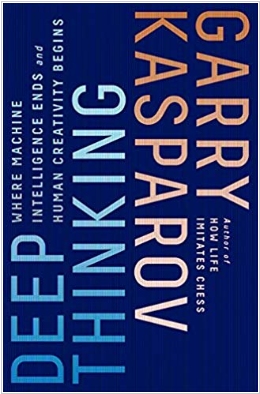
Deep Thinking offers an unparalleled insider's perspective on Kasparov's historic match against Deep Blue, and provides a unique insight into the evolution of playing chess against computer programs. Kasparov's personal account delves into the societal impact of artificial intelligence (AI) in today's world, and highlights the potential benefits of technology.
While the book touches on the penetration of AI in society, it primarily focuses on Kasparov's experience with the advancements in chess programming and how he coped with the psychological challenges of playing against machines. Kasparov shares his strategic preparations and thought process during these headline matches, offering readers a firsthand narrative of his behavior and the broader process.
For avid followers of Kasparov's career, Deep Thinking offers valuable insights and information. However, if you are specifically seeking a book solely on AI in chess programming, this may not be the ideal choice. Instead, the book provides a compelling account of Kasparov's personal journey, his encounters with AI, and his reflections on the intersection of technology and the human mind.
See also: Top 10 eBook Organizers
1. On Intelligence

This thought-provoking book, published over a decade ago, continues to captivate with its fresh perspective on the ongoing debate about artificial intelligence (AI) and the potential for creating super-intelligent machines. The author's insights shed light on the intricacies of human intelligence, demystifying why replicating it in computers has proven to be a formidable challenge. The book's relevance to the current discourse on AI is evident, and its prescience in anticipating future developments in the field is remarkable.
The author's personal journey, as shared in the book, is particularly impressive, showcasing his willingness to challenge conventional wisdom and the prevailing approaches in the AI industry. His quest to understand the complexities of the human brain and its relation to AI is evident in his unique perspective, which challenges established notions and offers novel insights.
While the book admirably introduces readers to the concept of invariant representation as one of the greatest scientific mysteries of our time, some readers may find themselves wanting more in-depth exploration of the nature of the problem and potential solutions. Nevertheless, the author's pioneering work in elucidating the challenges and possibilities of AI is noteworthy.
With its compelling analysis and fresh perspective, this book is poised to become one of the seminal works in the field of AI. Its insights into human intelligence, challenges in replicating it, and the author's unique approach make it a thought-provoking and essential read for those interested in the intersection of neuroscience, computer science, and the future of technology. As the field of AI continues to evolve, this book will likely remain a cornerstone in understanding the complex and dynamic relationship between machines and human intelligence.
2. Our Final Invention: Artificial Intelligence and the End of the Human Era

Elon Musk handpicked this book as one of the top 5 must-reads on the future, and for good reason. Written from the vantage point of a seasoned journalist, Barrat's work is a captivating exploration of the world of artificial intelligence (AI), drawing on meticulous research and thought-provoking interviews with key players in the field. In his thought-provoking conclusion, Barrat sounds a dire warning: once we achieve Artificial General Intelligence (AGI), the game is fundamentally changed, and not in humanity's favor.
Barrat paints a vivid picture of a future where superintelligent AGI machines outstrip human intelligence at an exponential pace, leaving humanity in the dust like ants or mice in comparison. He argues that the concept of "friendly AI," or machines designed with ethical considerations, will likely be an afterthought, if considered at all, until it's too late. This chilling insight resonates deeply, as history has shown that humanity often forges ahead without heeding caution or heeding the concerns of skeptics, especially when there are financial or power incentives involved.
The central question Barrat raises is a weighty one: can humankind truly create a self-learning, general intelligent machine, or are we hurtling towards a future where our own creations surpass us in ways we cannot comprehend? As Musk himself has warned, the implications of AGI for humanity are profound and require careful consideration, lest we find ourselves at the mercy of our own technological marvels. Barrat's book serves as a stark wake-up call, urging us to contemplate the future of AGI with urgency and foresight.
3. How to Create a Mind

This intriguing book delves into the revolutionary concept of the pattern recognition theory of mind, proposing that the neocortex operates on a fundamental algorithm that can be unraveled through reverse engineering. The author passionately argues that unraveling the brain's complexity can pave the way for the development of true artificial intelligence. Ray Kurzweil, a leading visionary in the field, takes readers on an enthralling journey through the intricacies of the brain and the limitless possibilities of artificial intelligence in the future.
Divided into eleven thought-provoking chapters, the book covers a wide range of topics, starting with captivating thought experiments on the world and the intricacies of thinking. The author then unveils the pattern recognition theory of mind as a model for understanding the neocortex, shedding light on the biological aspects of this crucial brain region. The exploration continues with insights into the workings of the old brain and its transcendent abilities, before delving into the potential of biologically inspired digital neocortex and the concept of the mind as a computer.
The book also delves into thought experiments on the mind itself, discussing the application of the law of accelerating returns to the brain and addressing potential objections to the theory. Kurzweil's captivating writing style and in-depth analysis make for a compelling read that challenges conventional notions about the brain and the future of artificial intelligence.
With its unique perspective and thought-provoking ideas, this book is a must-read for those interested in the cutting-edge field of artificial intelligence, and anyone curious about the intricacies of the human brain and its potential for unlocking the mysteries of true AI. Kurzweil's visionary insights and meticulous research offer a fresh and captivating perspective on the intersection of neuroscience, computer science, and the future of technology.
4. Applied Artificial Intelligence: A Handbook For Business Leaders

This book serves as an excellent introduction to the world of artificial intelligence (AI) for those who are new to the topic and seeking a basic understanding. It is specifically tailored towards executives and decision makers, positioning itself as a valuable business development tool for speaking engagements and consulting opportunities. However, if you already possess knowledge in AI, data mining, machine learning, and deep learning, the book may not offer significant new insights.
Given the rapidly evolving nature of the AI field, the book wisely avoids delving into technical details, making it relevant for a considerable period of time as the industry adopts AI into various business processes and solutions. Its focus on providing a high-level overview and practical applications of AI in the business world makes it a valuable resource for those seeking to understand the potential implications and opportunities of AI for their organizations.
While the book may not cater to readers with extensive expertise in AI, it serves as a valuable starting point for those who are eager to grasp the fundamental concepts of AI without prior knowledge. It presents a concise and accessible overview of the field, making it a useful tool for business professionals and decision makers who wish to gain a foundational understanding of AI and its potential impact on their industry.
5. Deep Thinking: Where Machine Intelligence Ends and Human Creativity Begins

Deep Thinking offers an unparalleled insider's perspective on Kasparov's historic match against Deep Blue, and provides a unique insight into the evolution of playing chess against computer programs. Kasparov's personal account delves into the societal impact of artificial intelligence (AI) in today's world, and highlights the potential benefits of technology.
While the book touches on the penetration of AI in society, it primarily focuses on Kasparov's experience with the advancements in chess programming and how he coped with the psychological challenges of playing against machines. Kasparov shares his strategic preparations and thought process during these headline matches, offering readers a firsthand narrative of his behavior and the broader process.
For avid followers of Kasparov's career, Deep Thinking offers valuable insights and information. However, if you are specifically seeking a book solely on AI in chess programming, this may not be the ideal choice. Instead, the book provides a compelling account of Kasparov's personal journey, his encounters with AI, and his reflections on the intersection of technology and the human mind.
See also: Top 10 eBook Organizers

